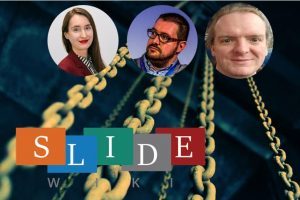In the first part of this webinar, Alexandra Garatzogianni (Leibniz University of Hannover) will present the H2020 SlideWiki project and its OpenCourseWare (OCW) Competition. Alexander Mikroyannidis (Open University, UK) will present SlideWiki’s open education trials, and Allan Third (Open University, UK) will elaborate on the SlideWiki’s Learning Tools Interoperability (LTI) standard, which allows educators to embed SlideWiki directly into their courses. In the second part of the webinar, Alexander will showcase Blockchain applications in open education and Allan will analyze the importance of the semantic blockchain. A Q&A session, during which the attendees will have the opportunity to raise questions, will finalise this webinar.
Date: Tuesday, 14 August, 2018
Start time: 15:00 – 16:00 CEST (Germany time)
Please register here now in order to reserve your slot.
Webinar ID: 413-568-699
Additional information
Part I: SlideWiki’s open education trials & integration with Learning Management Systems
Producing or finding and reusing high-quality educational content online can be a laborious and costly process. With the open-source and open-access SlideWiki platform, the effort of producing and reusing highly-structured remixable educational content can be crowdsourced and therefore widely shared. SlideWiki employs crowdsourcing methods in order to support the open education community in authoring, sharing, reusing and remixing opencourseware. This presentation will showcase a case study of this platform carried out in the context of open education and informal learning and will report on the feedback received thus far from members of the open education community.
To get the most from open educational content produced with SlideWiki, it is important that it can be used with educators’ and institutions’ existing practices and workflows. In real formal education settings, this often means that it should be usable in a Learning Management System (LMS). SlideWiki supports the industry standard method for connecting external tools to an LMS – the Learning Tools Interoperability (LTI) standard, which allows teachers to embed SlideWiki directly into their courses, allowing students to view, create, edit and remix open educational content, depending on the particular activity selected by teachers. This presentation will explore the opportunities offered by this integration, in terms of consumption and co-creation of material, learning analytics and reuse of high quality teaching materials.
Part II: Blockchain applications in open education & semantic blockchain
The emergence of Blockchain technology promises to revolutionise not only the financial world, but also open education and lifelong learning in many different ways. Blockchain technology offers opportunities to thoroughly rethink how we find educational content and training services online, how we register and pay for them, as well as how we get accredited for what we have learned and how this accreditation affects our career trajectory. This presentation will explore the different aspects of open education and lifelong learning that are affected by this new paradigm and will describe an ecosystem that places the learner at the centre of the learning process and its associated data.
The new opportunities afforded by blockchain technology for education will be most effective if they can be combined with the existing power of the Web and with the growing possibilities for machine intelligence. To enable this requires the use of a semantic blockchain, integrating the trustworthiness of a distributed ledger with the decentralised and rich representations of the Semantic Web. This presentation will discuss the possibilities which will be afforded by the combination of trustworthy educational data enhanced with meaningful Web-accessible Linked Data, and what these developments will mean for students, educators and the employment market.



